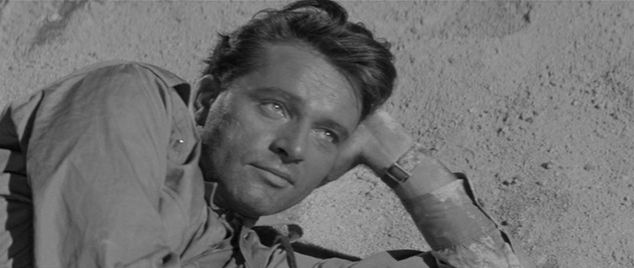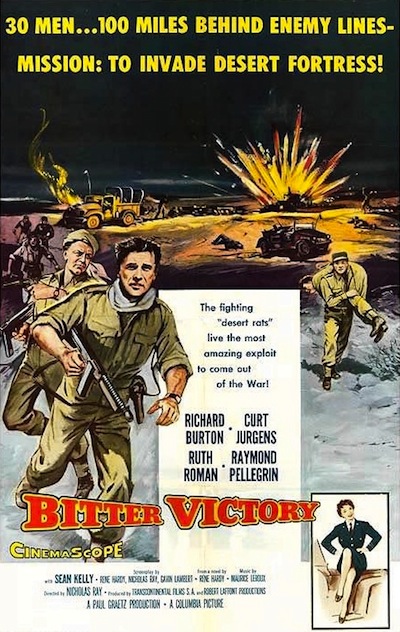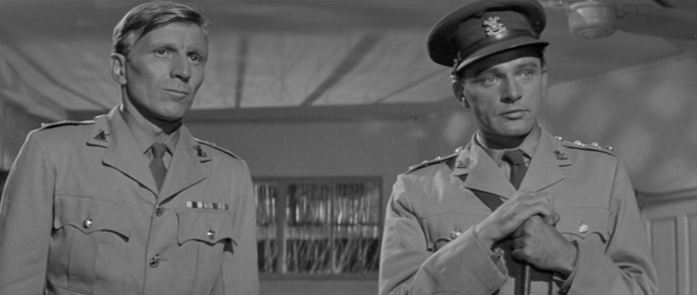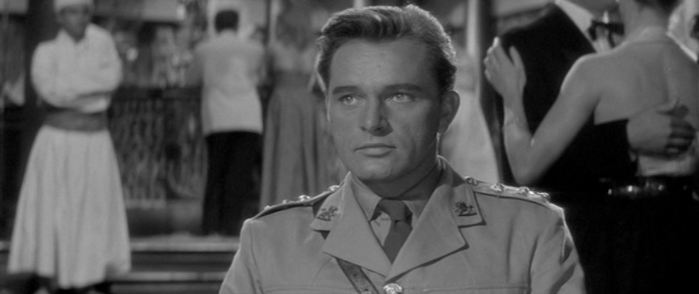Bitter Victory (1957) pits a young Richard Burton against an older and wiser Kurt Jürgens. This was back in the days when Richard Burton could get away with playing an intellectual; that’s what he is supposed to be at least. Bitter Victory, (dir: Nicholas Ray) is supposed to pit a cerebral soldier (Burton) against an all-out man of action (Jürgens) and although this angle winds up being suppressed, the general theme is of a battle for command between two opposed types of male. Watching Bitter Victory, you know immediately that nobody has messed with the script and the vision, which is faithfully placed before us by the mighty Nicholas Ray.
As is often the case, Burton is at his best in close up and in more dramatic or romantic scenes. In the action scenes in Bitter Victory, Rich doesn’t stand out in any particular way, not like Christopher Lee does for example. Lee, who is the tallest person in this film by far, is physically threatening and a powerhouse of action, even when he’s standing still. Like the others though, he can’t match what we have come to call ‘The Voice’.
The voice of Richard Burton is at its most epic in Bitter Victory, in the opening scenes, first when he is being interviewed for the mission, and then later in love scenes with Ruth Roman. Very much of its time, Bitter Victory also subverts some of the basics of the war tales that were becoming extremely popular at the time, by being a story of cowardice and lost love, all of which is tempered with deceit and the message that just because somebody holds rank, it doesn’t make them the best fit for the job in hand. Burton was the perfect choice however for the pointed dialogue that the script turns out, and without making it hammy, manages a few smouldering love scenes, as well as some classic battle cuts.
Richard Burton, Bitter Victory (dir: Nicholas Ray, 1957)
As the title suggests, Bitter Victory is in essence an anti-war film, and it’s great how much of this sentiment is concealed in what appears at first to be standard military / cinematic fare. What you get is the futility of being in a war, seen from a most personal viewpoint, and Burton (who says that he ‘kills the living and saves the dead’) manages to convey all of this, with doubt plastered across his handsome brow. It’s makes of Bitter Victory a most downbeat and emotional drama, and one that is hard to resist. These men are lovers after all, and not the 100% fighters you normally find in war films, and this is more true of Burton’s character than it is of others in the fray. We hear it said early on — the enemy you fight is not the one you think of — and the final scene cements it, when the medal is shown as representing nothing, as meaningless and bitter a victory as there can be.
Word is that on seeing Bitter Victory at the Venice Film Festival, Jean-Luc Godard made the following iconic statement "Le cinema, c'est Nicholas Ray (The cinema is Nicholas Ray)." Given the massive pedigree of Ray whose output included Rebel Without a Cause and Bigger Than Life, this would seem a strange one for Godard to land upon — but it is probably Nicholas Ray’s most masculine film, and the story of one British officer willing to kill or let another British officer die is clearly ahead of its time. The cinematography is strong and in places quite exceptional, especially the scenes in the desert which may remind you of David Lean's Lawrence of Arabia which was only a few years away — in fact there may well be an influence — in fact the relationship between Burton and Jurgens is slightly similar to the one between O'Toole and Shariff's characters in that film.

Richard Burton, ever the idol
What Godard doubtless saw then was a more human side to the action of the already hammy and traditional war film, which were working hard in the era to re-write the process of battle in order to show everyone involved as heroic merely by dint of their showing up for the war. Although Nicholas Ray’s films often seem to aspire towards being independent artworks however, they were not, and so there always remains an essential tension between their action and the large-scale audiences which the studios intended them to reach. In Bitter Victory however, the fatigue of war is more perfectly expressed than it was in any other film of its day, including The Naked and the Dead, which was to appear one year later in 1958.

Bitter Victory (1957) at Wikimedia Commons
Bitter Victory (1957) at Wikipedia


